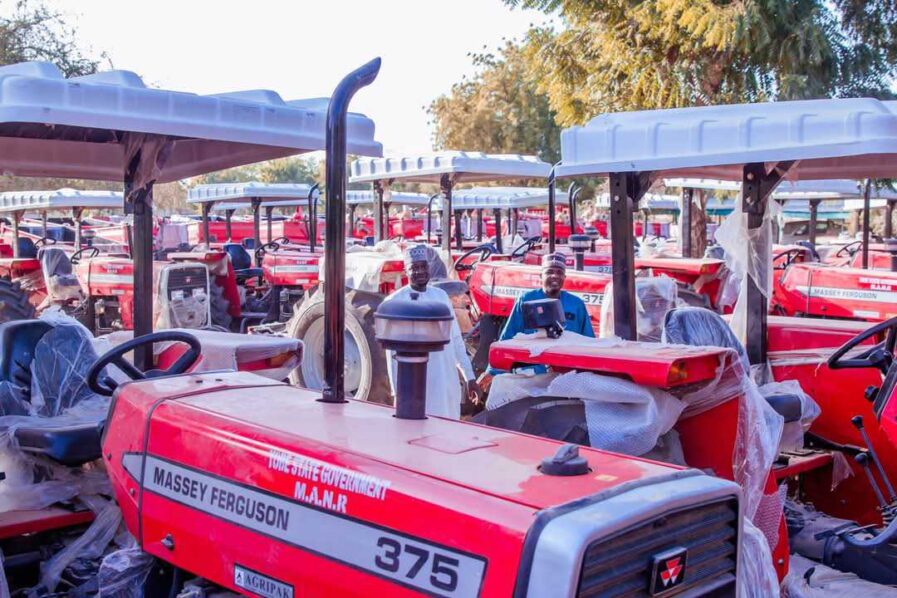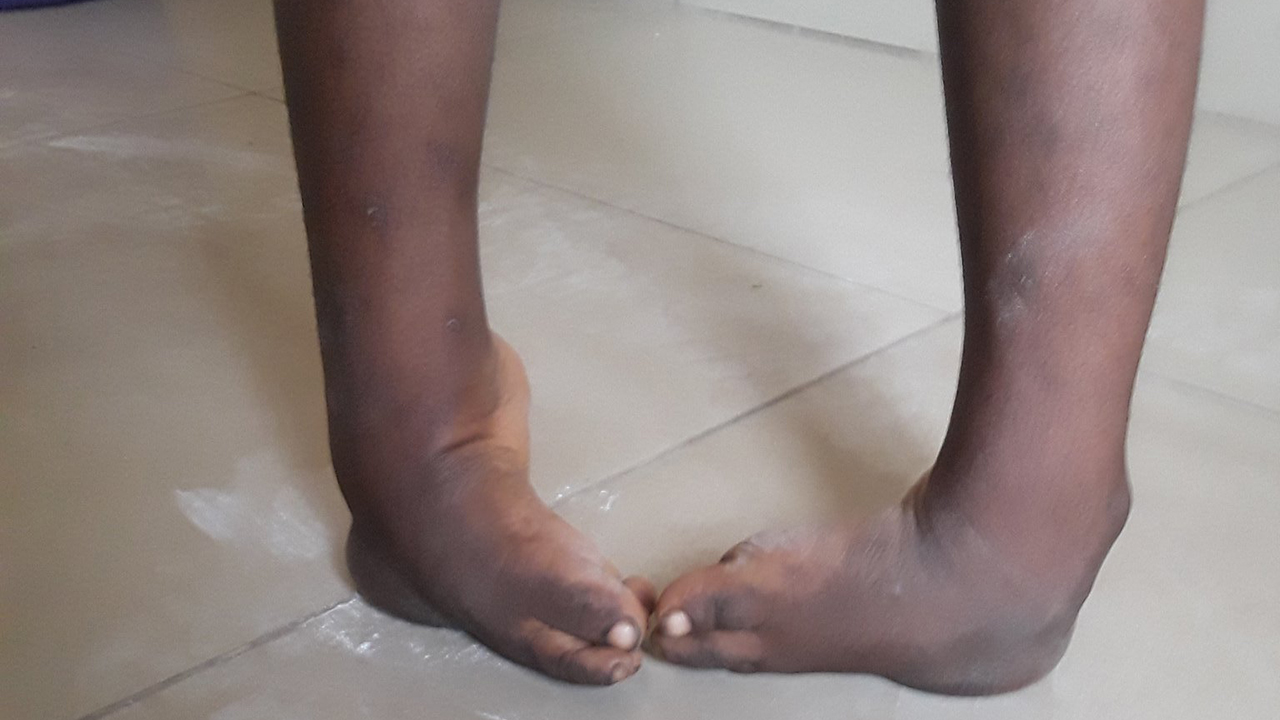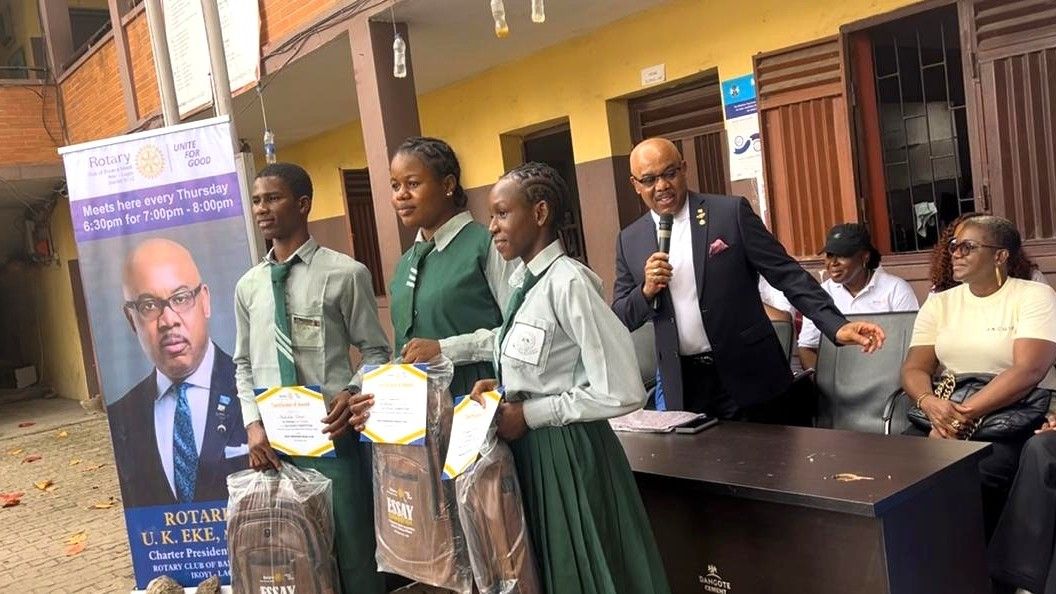
The Federal Government on Tuesday said it has started taking delivery of 2,000 tractors ordered from Belarus for distribution to farmers across the country.
It also said that the government has started plans for the reorganisation and recapitalisation of the Bank of Agriculture, which it said would be concluded before the end of the first quarter of 2025.
Confirming the development, Minister of Agriculture and Food Security, Abubakar Kyari, said 255 tractors have so far arrived in the country, with more expected in due course.
These, according to Kyari, are moves by the President Bola Tinubu administration for its Renewed Hope Agenda, geared towards reducing food inflation, increasing food production, and reducing foreign currency expenditure.
He said 85 containers, each carrying three tractors, among other equipment, are already being received in the country in batches.
He disclosed that the government is also focused on crashing the price of food commodities in the country, hence the adoption of new measures by the authorities to make farming seamless.
The minister, who addressed newsmen during the 2025 maiden edition of ‘Meet the Press’ organized by the Media Department of the Presidential Villa, Abuja, disclosed that food prices have also begun to drop due to what he described as “good rainfall, a bumper harvest,” as well as effective government policies.
“The 2024 farming season was very successful, with farmers across the country recording high yields. The government is working to sustain this progress by supporting wheat farming in highland areas like Taraba State and providing modern farming tools to farmers,” Kyari stated.
The minister said cutting-edge technology, including the use of drones, would also be introduced in the new farming season to boost and facilitate food production.
He said, “We have started taking delivery of the 2,000 tractors we ordered from Belarus, which will be distributed to farmers. The government will also focus on increasing tomato farming in the South-East and South-West, with harvests expected by May.
“For the dry season, we are planning to cultivate at least 400,000 more hectares of farmland, and fertilizer supplies are being improved to help farmers boost their output.
“The government is committed to supporting farmers with the resources they need to produce more food and reduce the cost of living.”
He also revealed that Nigeria’s agriculture sector is growing stronger and will continue to improve in 2025.
According to the minister, development partners are showing greater confidence in Nigeria’s agricultural sector, noting that the level of trust and collaboration has never been seen before, reflecting the positive impact of the government’s policies and progress in the sector.
“With improved farming practices, better tools, and increased production, Nigeria is becoming a stronger player in agriculture, attracting more support and partnerships from global organizations.
“The government will continue to build on this momentum to further boost the sector and strengthen food security in the country,” he said.
The minister further said that the government was expecting 9,000 sets of spare parts that come with the procurement.
Kyari declared that the recapitalization of the Bank of Agriculture will be completed before the end of the first quarter of 2025, to support the funding of smallholder farming activities.
The recapitalisation of the bank, which has been delayed for years, is seen as a panacea for the inadequate funding of commercial agriculture. Statistical evidence shows that the highest commercial bank loan to the sector between 2014 and 2021 was N1.04 trillion in 2020, which was only 5.15 percent of the total commercial bank loan over seven years.
He noted that the bank, with about 109 branches, has the potential to aid funding for the agriculture sector.
Recall that at a meeting of the National Council of Privatisation (NCP) in 2024, Vice President Kashim Shettima, Chairman of the Council, had inaugurated a committee, headed by Wale Edu, Minister of Finance and Coordinating Minister of the Economy, to work out modalities for the resuscitation of the bank.
The move is part of the government’s response to escalating food insecurity, as part of strategic interventions aimed at mitigating the crisis.
Kyari explained that these efforts are complemented by public financing mechanisms, development partners, and private banks, collectively working to strengthen agricultural programs across the country.
He cited successful partnerships with the International Fund for Agricultural Development (IFAD), a United Nations organization based in Rome.
In 2024, the positive outcomes of IFAD-funded projects—such as the Livelihood Improvement of Family Enterprise for the Niger Delta—led to an additional grant of $32 million, along with an extension of the project’s timeline, he revealed.
The Value Chain Development Nigeria program also secured a two-year extension. These occurrences, Kyari argued, further illustrate the faith development partners have in the administration’s ongoing agricultural reforms.
The agric minister also noted that the government is addressing post-harvest losses through cold storage and improving logistics.
While acknowledging that the 2024 budget faced competing priorities nationwide, he emphasized the government’s commitment to security in the 2025 budget.
He noted that many of the agricultural gains seen in 2024 were tied to newly accessible farmlands in regions previously hindered by insecurity.
He said, “I’m sure you must have seen the budget, and with 2024, there are competing needs in Nigeria, but you must also appreciate that one area that we are highly excited about is the emphasis on security by Mr. President in the 2025 Budget.
“We have seen, and we know that some of the results, the successes that we received in 2024 were as a result of some of those inaccessible lands due to insecurity that opened up. Case in point is Borno State, where terrorism was very high.
“My own local government (Mobbar) before now was not even accessible to farmers, but there is one place, along the river as long as 18 kilometers, where they did a bumper harvest of rice in the dry season last year. So many other areas, like Katsina State, have reported an improvement of almost 70 percent in security, which has opened up farmland for our farmers.
“So, it’s not as if we are to support each and every smallholder farmer. No country can do that. But what we are saying is we are also exposing our smallholder farmers to the issue of having access to funding, to credit.
“Something that I also missed out on is the reorganization and recapitalization of the Bank of Agriculture. It’s in the process, and very soon, within the first quarter of this year, you will see a report that will outline the reorganization and recapitalization of the Bank of Agriculture.
“The Bank of Agriculture has branches in all 109 senatorial districts and can easily reach out to those farmers.
“What we are saying is that the smallholder farmer lacks capital. So, we have written to some banks, and we are also reorganizing the Bank of Agriculture to support what the government is doing in the sense of public financing in the budgets and what have you.
“So, the budget alone cannot support agriculture, but we have to look at development partners. We’re very excited and happy with development partners. Case in point, IFAD, the International Fund for Agricultural Development, is a United Nations Rome-based organisation.”
On the number of tractors received, the minister said, “Yesterday (Monday), I think while some of the members were with me, we had to call the agents, and they have told us that they have 85 containers that have arrived, and they are coming almost on a weekly basis.
“So, if you interpolate, every container takes about three tractors, so do the calculations. We’re looking at about 200 and something tractors that have arrived.
“But the commitment is not how much we have now; it’s when are you going to give us the 2,000 with all the 9,000 implements? Because there will be 9,000 implements. We are looking at 2,000 tractors.
“That tractor, in itself, cannot do anything, but for every tractor, there is a plough. So, we have 2,000 ploughs. Every tractor has a harrow, so there will be 2,000 harrows. Every tractor will have a seeder, which is a planter. Then we’ll also have boom sprayers, which are 2,000.
“Then, in addition, we have trailers, but instead of 2,000, there will be 1,200. The reason for this is that trailers are not something that spoil easily. We have some that NASENI has started rehabilitating. So, they will be put together as part of the equipment that will be available for every tractor.
“In addition, we also have 9,000 sets of spare parts that will come with this particular procurement. We also have 10 combined harvesters of 330 horsepower.
“These are huge combined harvesters that will be able to do about one and a half hectares per hour. So, if you just imagine, in one day, you’ll be able to do nothing less than 10 hectares. Ten hectares is like 13 football fields. So, you can imagine, in one day, one harvester will be able to harvest a cornfield.
“So, we also have service vehicles, about 12 service vehicles that will come. These are mobile workshops with all the items that will be placed in all these areas where we’ll have the tractors.”
On the positive side, Kyari said the “country experienced positive harvests in the 2024 farming season that have far exceeded what we had in previous years.”
Kyari explained that these efforts are complemented by public financing mechanisms, development partners, and private banks, collectively working to strengthen agricultural programs across the country.
He cited successful partnerships with the International Fund for Agricultural Development, a United Nations organization based in Rome.
In 2024, the positive outcomes of IFAD-funded projects—such as the Livelihood Improvement of Family Enterprise for the Niger Delta—led to an additional grant of $32 million, along with an extension of the project’s timeline, he revealed.
The Value Chain Development Nigeria program also secured a two-year extension. These occurrences, Kyari argued, further illustrate the faith development partners have in the administration’s ongoing agricultural reforms.
The Minister also noted that the government is addressing post-harvest losses through cold storage and improving logistics.
While acknowledging that the 2024 budget faced competing priorities nationwide, he emphasized the government’s commitment to security in the 2025 budget.
He added that many of the agricultural gains seen in 2024 were tied to newly accessible farmlands in regions previously hindered by insecurity.






